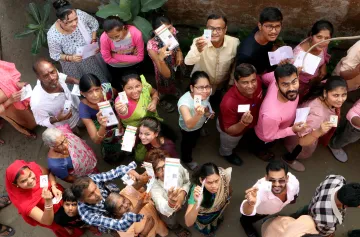As polling concluded for Maharashtra's 288 assembly seats on Wednesday, all eyes are now on the results scheduled for release on November 23 by the Election Commission of India. While several exit polls predict a high possibility of the Mahayuti alliance (comprising BJP, Shiv Sena, and NCP) securing victory in the highly anticipated 2024 assembly elections, a tough competition from the Maha Vikas Aghadi (MVA) alliance cannot be ruled out. Exit poll predictions suggest that the MVA could potentially secure over 140 seats in the 288-member assembly, giving a formidable fight to its rival.
The 2024 Assembly Poll Results
With anticipation building around the November 23 results, which will reveal whether a Maha Vikas Aghadi or Mahayuti-led government will take charge, it is worth revisiting the political dynamics of the past two assembly elections and the significant shifts in allegiance that have shaped Maharashtra’s political history.
The 2019 Assembly Elections
The 2019 elections marked a turning point in Maharashtra's political landscape, with the BJP and Shiv Sena parting ways after years of alliance due to disagreements over the Chief Minister’s post. The Shiv Sena, which had won 56 seats against the BJP’s 105, demanded a rotational Chief Ministerial arrangement, a demand that the BJP refused, leading to the alliance's breakdown. The resulting hung assembly led to the imposition of President’s Rule in the state.
However, the political drama didn’t end there. The undivided Shiv Sena began negotiations with the NCP and Congress to form a government. Just as they were poised to succeed, BJP leader and former Chief Minister Devendra Fadnavis made a surprising move by taking the oath as Chief Minister in a sudden ceremony. This move was backed by NCP leader Ajit Pawar, who appeared to have revolted against his uncle, party patriarch Sharad Pawar.
Fadnavis’s government, however, lasted only 80 hours, as the Supreme Court ordered an immediate floor test. Ajit Pawar then returned to the NCP fold, forcing Fadnavis to resign. Subsequently, Uddhav Thackeray was sworn in as Maharashtra’s Chief Minister, heading the Maha Vikas Aghadi government with the support of Congress and NCP.
The MVA government remained stable until 2022 when Shiv Sena leader Eknath Shinde led a rebellion against party chief Uddhav Thackeray. Shinde, along with 39 other Shiv Sena MLAs, defected and eventually aligned with the BJP. This reduced the MVA government to a minority, prompting Thackeray to resign. Shinde was then sworn in as Chief Minister, with Devendra Fadnavis as his Deputy Chief Minister.
This revolt was soon mirrored within the NCP, where Ajit Pawar led a faction of MLAs to align with the BJP, effectively splitting the party into two factions. Ajit Pawar was subsequently appointed as a Deputy Chief Minister under the BJP-Shinde government.
What happened in 2014 polls
In 2014, the BJP formed the government in the state with Devendra Fadnavis elected as the Chief Minister of the state. The BJP in 2014 won 122 seats, Shiv Sena led by Uddhav Thackeray had then won 63 seats. Congress too won 42 seats, while NCP won 41 seats.
